Origins of My Love of Marvel
- styrofoamturkey
- Dec 24, 2021
- 9 min read
Updated: Mar 13, 2024
Marvel Comics
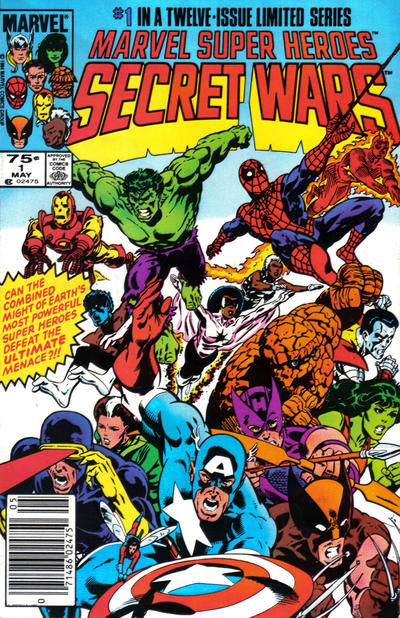
A while back, I mentioned that I can't really remember a time when I didn't know what Doctor Who was. While it's not quite an identical situation, I don't have a clear recollection of when exactly I learned about the existence of Marvel comics either.
I suspect, actually, that my first experiences with Marvel probably weren't with the comics at all but from some of the media that had spun-off from them. The '67 Spider-Man cartoon used to play on a fairly frequent syndicated loop so I may well have started with that. I certainly recall seeing a fair amount of it. There was also the Bill Bixby/Lou Ferrigno Incredible Hulk series. I know I saw that as well, though a recent rewatch has reminded me that my memories of it weren't too clear. I have oh so vague memories of seeing some of the Nicholas Hammond live-action Spider-Man series, though, given when it aired, I suspect all I'm remembering is a repeat of the original pilot movie for it. The earliest Marvel-related series that I recall watching on any sort of regular basis was Spider-Man and His Amazing Friends.
Eagle-Eyed readers, or anyone with a pulse, may have noticed an awful lot of Spider-Man on that list, likely contributing to the fact that Spider-Man remains my favorite superhero to this day.
Somewhere, in the midst of all that, I found out that comic books existed. Not far from the store my parents ran, was a little convenience store called the Wigwam. Within the Wigwam was a spinner rack full of comics. When my parents went into the Wigwam to get something, I'd check out the spinner rack to alleviate my boredom. I'd grab stuff and flip through it and generally be fascinated by these little doorways into stories. I was already enamored of narrative and this was a whole new medium through which stories could be told.
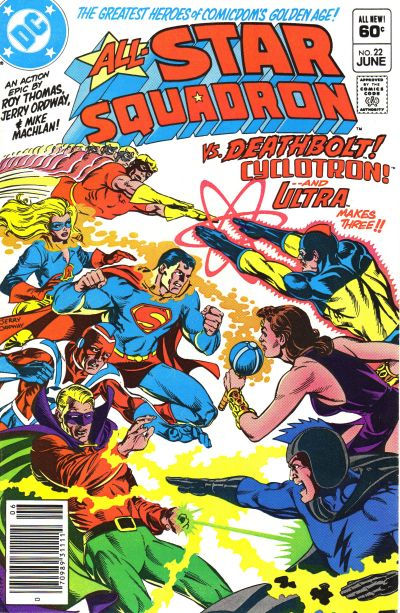
My memories get a little more concrete at this point and I do distinctly recall the first comic book I ever bought. It was not, in fact, a Marvel comic, but a DC title, All-Star Squadron # 22. I liked it. Indeed, I read it many times over. Superman was a prominent character in it and I knew him from watching SuperFriends and various other cartoons. There were a ton of other characters in it, most of whom were new to me, but I figured I'd learn about them as I went, just as I'd done for Doctor Who and other stories I'd picked up mid-run.
Problematically, though, I missed a bunch of issues after that, picking up with # 27. Despite having missed the end of the storyline from my earlier issue, I actually liked this one better. It was more focused on a pair of characters, Dr. Fate and the Spectre, who were new to me but also fascinating.
But then I missed more issues after that. I didn't give up, though, grabbing up, All-Star Squadron #'s 30 & 34. This disjointed method of reading was not conducive to gaining much of a foothold in DC's fictional setting. I liked the individual entries, but had little-to-no sense of the overall flow of the story.
I have occasionally wondered if, had my early DC reading not had so many holes in it, I would have become as enamored of DC's comics as I later became of Marvel's. Given the benefit of later knowledge, I suspect not. This isn't because DC's world is less compelling, but because of the specific book I chose. All-Star Squadron was, I later discovered, a book whose continuity was particularly odd, designed to essentially fit in-between the issues of All-Star Comics, a book that had been published back in the '40s. Even if I hadn't had gaps in my collection, there'd still be holes in the narrative I couldn't fill without access to comics from four decades earlier. Nevertheless, All-Star Squadron introduced me to the medium of comic books in general and I'll always be grateful to it for that.
While I'm on the subject, I think it's worth noting that, while my analyses on this site are going to focus much more on Marvel, I don't dislike DC comics. My all time favorite comics series, the original Watchmen, is a DC offering. For that matter, I don't manifestly dislike the comics from any smaller publisher, either. Marvel was just the first fictional comic universe I really "fell for" and, well, you never forget your first crush, do you?
I knew of Marvel comics before I read any of them, I'm sure of that. Being a young boy in the '80s, I loved both Transformers and G.I. Joe and I was aware that Marvel published comics featuring both of them. Indeed, I recall borrowing a friend's copy of Transformers # 1 and liking it. It wasn't just a straight adaptation of the beginning of the Transformers cartoon as I'd expected but it's own spin on the tale. Indeed, I suspect that it was reading this that first impressed upon my brain the whole notion of a singular property having different continuities in different mediums. I liked the cartoon version of Transformers. I liked the comic version of Transformers. It didn't particularly bother me that they were different. I specifically recall liking that the comics were able to go a bit further in terms of the violence than the cartoons did. (And if I thought that was a contrast, it was nothing compared to when I later discovered that, in their comic, the G.I. Joe team fired real bullets instead of lasers.)
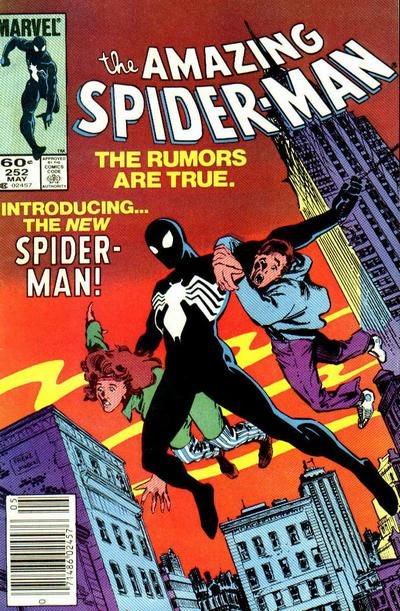
That same friend who'd lent me Transformers # 1 also lent me Amazing Spider-Man # 252, which excited me because I was already pretty familiar with Spider-Man. Any Spidey fans reading this will also know that it's a significant issue in being the first appearance of Spidey's black costume (which will later turn out to be an alien and then later bond with Eddie Brock to become Spidey's villain, Venom.) Issue # 252 doesn't actually give the origin of the costume, instead referencing Spidey's upcoming appearances in the title Marvel Super-Heroes Secret Wars which would retroactively tell the tale, foreshadowing and cross-promotion all in one. Like Peter Parker himself, I was fascinated with the new suit. I was also curious as to what these "Secret Wars" had been about.
Not long after, I managed to read Transformers # 3, in which Spider-Man, still clad in his cool new black suit, guest-starred. I really liked it. In retrospect, the story itself is no great shakes but I think what I liked most was that there was an integration of the two books, the building of a bigger fictional world in which both the Transformers and Spider-Man (and, by extension, anything else they crossed over with) existed. It also didn't hurt that Spidey spent most of the episode paired up with an Autobot named Gears, one of the few Transformers for whom I owned the toy.
There's some irony in this being the comic that cemented my concept of continuity as it's officially nothing of the sort. Years later, Marvel decided that the Transformers and Marvel universes were separate and thus this crossover doesn't really "count." It's been ejected. I still like it. Expect a Musing, at some point, on the relative worth of canon and continuity and which things do and don't "count." For now, suffice it to say I find an expansive view of continuity much more rewarding than one with lots of limitations.
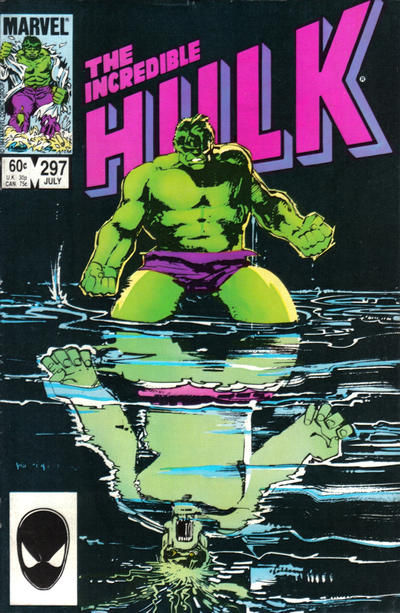
All of that is really more of a prologue, though, to the first Marvel comic I bought myself, Incredible Hulk # 297. I honestly have no idea what prompted me to buy this issue. I liked the Hulk live action TV show enough, but I wouldn't say that the Hulk had been a particular favorite character of mine (though he later became one.) I didn't even like the cover art very much. (I know Bill Sienkiewicz is a bit of a legend, but his style has never really been to my taste.) Perhaps I went into the Wigwam looking for a Spider-Man issue and they were out of those.
For whatever reason I bought it and read the tale of the tortured Hulk being chased by agents of S.H.I.E.L.D. that was the plot of the issue. I don't think I'd say it "wowed" me but it was enjoyable. There were definitely some differences between the TV Hulk and the comic Hulk and, as had been the case with the Transformers, I found that interesting. So it was that, about a month later, when I found Incredible Hulk # 298 at the Wigwam, I bought that too, completing my first ever purchase of two consecutive comic issues. In it, I found the Hulk tortured by an extra-dimensional villain called Nightmare (who'd appeared on the final page of # 297.) The gist of the issue was that Nightmare was molding the Hulk into a weapon to be used against a foe of his own, Dr. Strange.
Dr. Strange was a character I knew very vaguely from a single appearance in Spider-Man and His Amazing Friends. This story, however, made it clear that he wasn't just a backup character, but rather that he had a whole story of his own, complete with villains specific to him. The full context of Nightmare's villainy was a bit lost on me at the time. I'm now aware that Strange and the Hulk had been regulars in the Defenders title for many years and thus there was an added twist of the knife in that Nightmare was engineering Strange's downfall at the hands of his friend but I didn't know any of that at the time.
Then I missed issue # 299. Grrrr.
But I did pick up again at Incredible Hulk # 300 and that's the issue that turned me into a Marvel fan. I'd missed the big confrontation between Dr. Strange and the Hulk. Strange had apparently sussed out Nightmare's involvement and defeated him but at the cost of the part of the Hulk that was Bruce Banner, leaving the Hulk a creature of nothing but anger and brutality for the story in # 300, the aptly titled "Days of Rage."
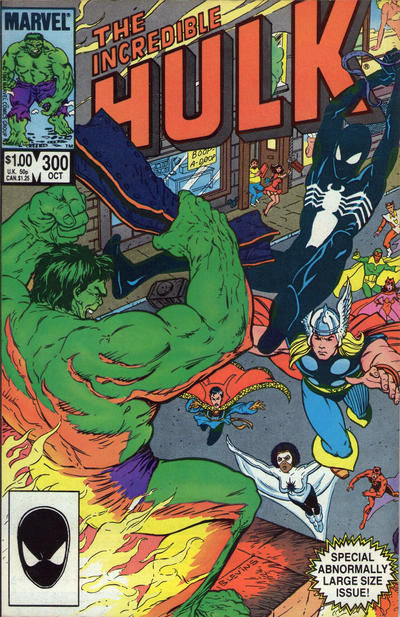
Incredible Hulk # 300 was an extra large issue and the premise of it was pretty simple. The Hulk was out of control in the middle of New York, wreaking untold havoc because any trace of conscience or humanity within him was gone. And everyone else had to stop him. S.H.I.E.L.D. Daredevil. Power Man and Iron Fist. The Human Torch from the Fantastic Four. My pal, Spidey (though I noticed he did more damage control than combat.) And the Avengers.
I think it was the Avengers that really caught my eye. It wasn't so much that they were impressive and powerful, although they were certainly the heroes who put up the most resistance to the Jade Giant's rampage. (The final duel between the Hulk and Thor is absolutely epic.) No, more than that, I think it was that the current lineup of Avengers was made up of heroes I'd never heard of before. Captain Marvel, the Scarlet Witch, Starfox, the Wasp, the Vision and Thor. (Yes, I'm quite sure this is the first time I encountered Thor.) That these were meant to be heroes of significant stature within this world was obvious. And the sheer power they wielded was staggering (which made it all the more impressive that the titular Hulk endured it and kept going.) These were clearly the heavy-hitters of the Marvel Universe and I knew nothing about them.
But I wanted to. That, I think is the key to why this issue expanded my interest beyond the casual, why I became interested in exploring Marvel as an integrated universe in addition to separate stories. Spider-Man is still my favorite superhero (barring a period during my teen years where it was Wolverine. What can I say? I was an angry teenager and Wolverine is the "cool angry guy.") But, while I enjoy following Spider-Man's narrative on its own, I enjoy following it as part of a larger universe even more. The more I explored, the more I realized that Marvel wasn't just telling stories, it was building a whole "reality."
I don't mean to imply that Marvel's unique in this regard. DC comics, for instance, have their own integrated reality, as do most superhero universes for that matter. The concept of linked, parallel storytelling is hardly something invented by Marvel. Marvel just happens to be the one that caught me and has never really let me go. It's snared a lot of others in its web as well and the Marvel Cinematic Universe films have, over the past 13 or so years, repeated that effect for a wider audience. There's an undeniable appeal to a storytelling setting that doesn't just include a Norse God, a patriotic super-soldier from the '1940s, a teenager who can crawl up walls and a talking raccoon but can have them all meet and interact. It's a setting that can tell a story set in an alleyway in Queens or on an alien world with equal claims to consistency.
I suppose it's a bit like Doctor Who in that regard. It can be about anything, but where Doctor Who threads one character through multiple genres, giving us a little taste of each, Marvel goes largely in the opposite direction, building all it's little sub-worlds and unique characters, then sandwiching them together to see how they mix.
That's the formula that snagged me almost 4 decades ago and it hasn't let me go since.
Previous Post: Fear and Wonder
Next Post: The Fantastic Four
First Post: Stories
Comments